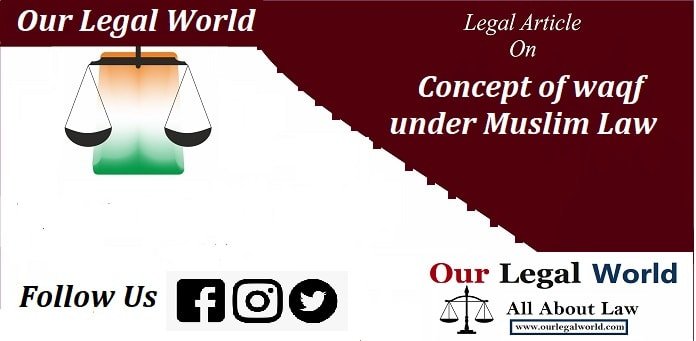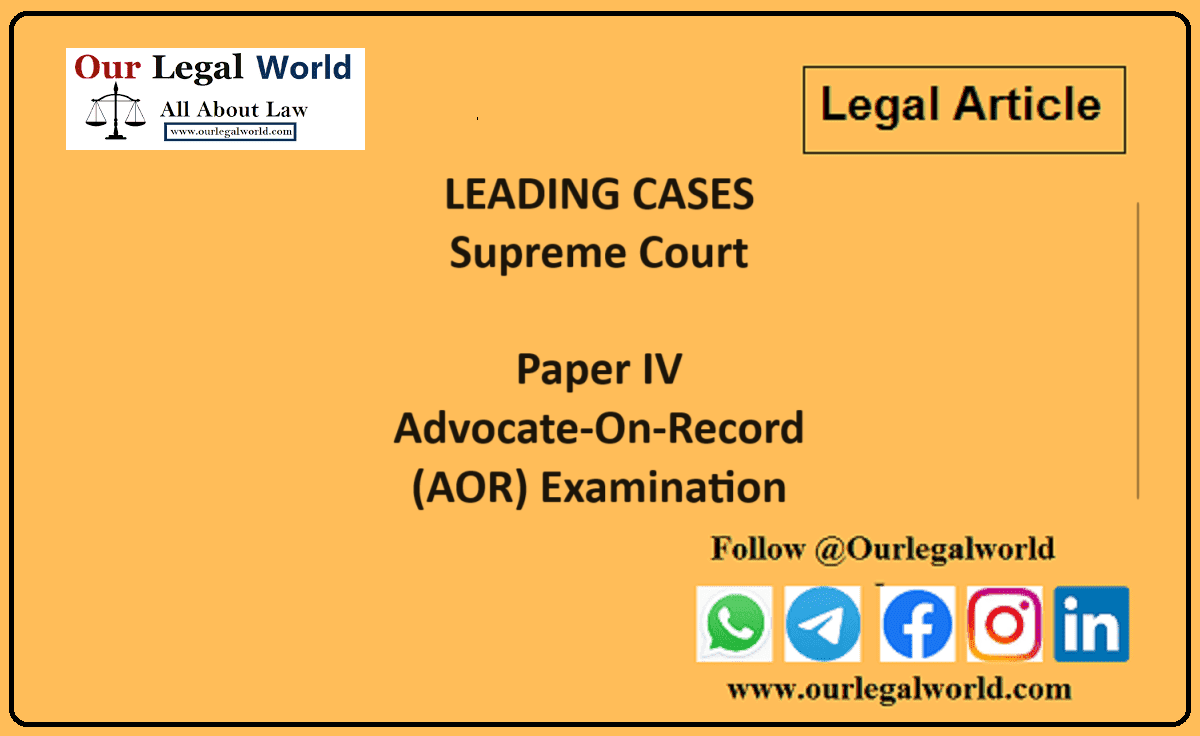WAQF UNDER MUSLIM LAW- Analysis
INTRODUCTION
The institution of Waqf has developed with Islam. There were no awqaf or any such parallel institutions in Arabia before the advent of Islam. Credit must be given to the Muslim jurists for having developed the jurisprudence of Waqf.
Although there is no mention of Waqf in Quran but such Quranic injunctions which deal with the charity are at the root of the development and extension of auqaf. One of such Quranic verse is, ” Giving alms to the poor has the reward to one alms, but that giving to kindred has two rewards”.
The law of Waqf, writes Ameer Ali, is “most important branch of Muslim Law, for it is interwoven with the entire religious life and social economy of Muslim. Waqf in its literal sense means detention or stoppage”.
Khawaja Mohammad Noor observes that the legal meaning of Waqf according to the accepted Doctrine of the Hanafi School is the extension of the proprietor’s ownership in the thing dedicated and its detention in the implied ownership of God in such a manner that the profits may revert to and be applied for the benefits of the mankind”. Waqf under the Muslim Law owes its origin to a rule laid down by the Prophet of Islam; and means, “the tying up of property in the ownership of the God almighty and the devotion of the profits for the benefit of human beings”. As the result the creation of a waaqif (settler) in the property is extinguished and the ownership is transferred to the Almighty.
DEFINITION
When we talk about the term ‘Waqf”, it literally means ‘detention, ‘stoppage’ or ‘tying up. Technically it means a dedication in perpetuity of some specific property for a pious purpose or a succession of pious purposes.
As defined by a Muslim Jurist, Abu Hanifa, Waqf means it is the detention of a specific thing in the ownership of the waaqif or appropriator, and the devoting its profits or usufruct to charity, the poor, or other good objects, in the manner of areeat or commodate loan.
Another eminent Muslim Jurist, Abu Yusuf defined Waqf as the detention of a thing in the implied ownership of almighty God in such a manner that its profits may revert to or be applied to the benefit of hid creatures.
The Shara-ya-ul-Islam says, “Waqf is a contract the fruit or effect of which is to tie up the original and to leave its usufruct free”.
The most comprehensive and simple definition of ‘Waqf’ is given in the Mussalman Waqf Validating Act, 1913 under Section 2 explains that waqf is the permanent dedication by a person professing the Mussalman faith by any property for any purpose recognised by Mussalman Law as religious, pious or charitable.
The Waqf (Amendment) Act, 2013 has substituted the definition of ‘Waqf’ in Section 3(r) of the Act 1995. It defines Waqf as the permanent dedication by any person of any movable or immovable property for any purpose recognised by the Muslim Law as religious, pious or charitable.
ESSENTIALS OF WAQF
SUNNI LAW
The essentials of a valid waqf according to the Hanafi School (Sunni Law) are as follows:
1. Permanent dedication of any property – The dedication of property for waqf must be permanent and the waaqif himself devote such property for a recognized purpose like religious, charitable or pious. If waqf made by the waaqif is for a limited period then such waqf is not a valid one and also there must not be any such condition or contingency should be attached otherwise then it will become invalid. Further, in Karnataka Board of Waqfs v. Mohammad Nazwer Ahmed, the house was dedicated by a Muslim merely for the use of travellers irrespective of their religion and status. The Court was of the opinion that it was not a waqf on the ground that under Muslim Law a Waqf must have a religious and pious motive and it must be for the benefit of Muslim community only and even if is secular in nature then the charity should be for the poor only.
2. Competency of the Waqf – The dedicator (waaqif) should be a person professing Mussalman faith and of sound mind and must not be a minor or lunatic.
3. For any purpose recognised by Muslim Law – This is also called the object of waqf. Thus the third essential of a valid waqf is that the dedication should be for a purpose recognised as religious, pious or charitable under Muslim Law.
SHIA LAW
According to Shia Law, ” waqf is a contract, the fruit or effect of which is to tie up to the original and to have its usufruct free” (Sharya-ul-Islam) .
The ‘Sharya-ul-Islam’ mentions four conditions aa being required in the subject of waqf. These are as follow:
1. As in Sunni law, it must be perpetual.
2. It must be absolute and unconditional.
3. The possession must be given of the thing appropriated (unlike Sunni law where mere declaration is sufficient).
4. It must be entirely taken out of waaqif. It means that the waaqif should not reserve any right or interest, even the usufruct of the dedicated property.
WHO CAN CREATE WAQF?
1. The person who is constituting waqf out of his own properties is called the founder of waqf or waaqif. The person who is dedicating his property must be competent enough to do so. There are some following conditions which need to be followed to become a waaqif and constitute a waqf-
The person must be a Muslim. The High Courts of Madras and Nagpur have observed that a non-Muslim can also constitute a valid waqf provided that the objective of such waqf must not be against the principles of Islam. Further, the Patna High Court was of the opinion that a valid waqf can be constituted by a non-Muslim but such a waqf would only be created under a public waqf and cannot be a private waqf, for example, an Imambara.
The person should be of sound mind. Any person who is not of sound mind is incompetent to create a waqf property on the ground such person is unable to judge the legal consequences of such an act. Hence, a waqf created by an insane or minor is void.
The person should have attained the age of majority.
2. Any individual may profess the capacity to constitute a waqf but may not have any right to constitute a waqf. The person of such kind cannot constitute a valid waqf. The subject matter of the waqf constituted should be owned by the Waaqif at the time waqf is created. The question of creation of waqf depends upon that a waqf can be created by a particular person depends upon whether there exists a legal right for the waaqif to transfer the ownership of the property or not.
A waqf of any property which is held by a widow in lieu of her unpaid dower then such property cannot be constituted by her because she is not an absolute owner of such property.
If a pardanashin lady wants to dedicate her property for creation of waqf then it is the duty of the beneficiary and the mutawalli to prove that woman had exercised such thing with her mind independently and after fully understanding the nature of such transaction.
3. A person can dedicate his entire property to constitute waqf but in case of the testamentary waqf, more than one-third of the property cannot be dedicated for such purpose.
DOCTRINE OF CYPRESS
The word Cypress literally means, “as nearly aa possible”. This term is essentially applicable to trust and in its technical sense means that if the wishes of the author of a trust cannot be carried out literally, they will be carried out as nearly as possible in the way desired by the author.
This doctrine is applicable to waqfs also. In cases where it is not possible to continue any waqf because of lapse of time or changed circumstances or legal difficulty or where the specified object has already been completed then the waqf may be permitted to continue further by applying this doctrine.
LEGAL INCIDENTS OF WAQF
1. Irrevocability – The view of Abu Hanifa is that a waqf can be revoked by waaqif, unless the declaration has been confirmed by a decree of a Court. But Abu Yusuf takes a contrary view and hold that a declaration of waqf is in its nature irrevocable. The opinion of Abu Yusuf is followed in India.
2. Inalienability – As the waqf property belongs to God, no human being can alienate it for his own purposes.
3. Perpetuity – It is an essential condition of waqf. A waqf for a limit period is invalid.
4. Pious or charitable use of usufruct – The product and benefits of the waqf property are utilised for such purposes which are recognized as religious, pious or charitable under Muslim Law.
5. Absoluteness – The settlement of the property in waqf is absolute. A conditional or contingent waqf is void.
MODES OF CREATION OF WAQF
Waqf can be created by the following modes-
1. By an act inter vivos – It means ‘between living voices, i.e., during the lifetime. A waqf under this mode is which is constituted during the lifetime of the waaqif and takes effect from that very time
2. By will – It is contradictory to the waqf created by an act inter vivos, which means that it takes effect after the death of the waqif.
3. During death or illness (marz-ul-maut) – As the gifts are made while the donor is on the death bed, it will operate till the extent of one-third of the property without the prior consent of the heirs.
4. By immemorial user- Waqf property can be established by way of the immemorial user although the limitation of time also applies to the creation of waqf.
COMPLETION OF WAQF
The question as to how a waqf is completed may be studied from the following two angles-
1. Where third person is appointed as the first mutawalli.
2. Where founder constitutes himself as first mutawalli, i.e., manager or superintendent.
KINDS OF WAQF
Under Muslim Law, waqfs have been classified into two categories :
1. Public waqf – A public waqf is one for public, religious or charitable purposes.
2. Private waqf – It is one for the settlor’s own family and descendants and is technically called, waqf-ulal-aulad. However, it is a family settlement by way of waqf.
WAQF ACT, 1913
The salient features of The Mussalman Waqf Validating Act, 1913 are the following-
1. According to this Act, a Muslim can tie up his property in perpetuity for the purpose of supporting his family and children, provided that he makes a provision that the ultimate benefits should go to the charitable object of a permanent nature.
2. Under this Act, it is not necessary that there should also be a concurrent gift to charity. A Muslim need not provide for any gift to charity until after the extinction of the whole line of descendants of the settlor’s family.
3. According to this Act, a Hanafi Muslim cannot enjoy the whole income or a life interest in the income of the trust property. He can only share in the income by way of maintenance.
4. The objective of the Act is explained under Section 3 of the Act, it states that it is lawful for a Muslim person to constitute a waqf which in all other aspects in accordance with the provisions of Muslim law, for the following purposes:
a) For maintaining and supporting his family, children or descendants wholly or partially.
b) If a person who is creating a waqf is Hanafi Muslim, also for his own maintenance and support during his lifetime or for the payment of his debts our of rents and profits of the property dedicated.
THE STATUTORY AND ADMINISTRATIVE CONTROL OF WAQFS IN INDIA
There are certain enactments which are provided for the creation and protection of public endowments, some of them are –
1. Charitable Endowments Act, VI of 1890
2. Official Trustees Act II of 1913
3. Religious Endowments Act XX of 1863
4. Section 92 and 93 of The Code of Civil Procedure, 1908
5. Charitable and Religious Trusts Act XIV of 1920
MUTAWALLI
The manager or superintendent of the waqf is known as Mutawalli. Under the Muslim system, in case of a waqf, all the rights of ownership to the property vest in God. The Mutawalli has no right in the property. He is merely a manager of the property.
In Allah Rakhi v. Shah Mohammad (AIR 1934 PC 77), the judicial committee called Mutawalli as ‘procurator’. It is not correct to say that holder of the post of a Mutawalli is not the holder of a mere office but is the holder of a property.
Also Read: Remedy & Damages under Law of Torts:- Our Legal World
WHO CAN BE APPOINTED AS MUTAWALLI?
Any individual who is of sound mind, who has attained the age of majority and the person is capable of performing the functions which are to be discharged under a particular waqf, can be appointed as Mutawalli of a waqf. If religious duties or spiritual functions are part of the duties of a Mutawalli then a female or non-Muslim cannot be appointed as a Mutawalli. A foreigner cannot be trustee of any waqf property in India.
WHO CAN APPOINT A MUTAWALLI?
Generally, the Mutawalli is appointed by the founder of the waqf at the time of creation of waqf. But if a waqf is created without appointment of a Mutawalli then in such circumstances he will be appointed by following eligible persons –
1. By the founder
2. Failing him, by the executor of the founder
3. Failing him, by the Mutawalli on his death-bed
4. Failing him, by the Court which in making the appointment of Mutawalli should be guided by the following rules:
a) The Court should not disrespect the directions of the settlor.
b) Preference must be given to a member of the settlor’s family rather than an utter stranger.
c) In a contest between settlor’s lineal descendant and ones who is not lineal, the Court is free to exercise its own discretion.
Under some cases, the Mutawalli can be appointed by congregation
POWERS AND DUTIES OF MUTAWALLI
A mutawalli may do all acts that are reasonable and proper for the protection of the waqf property and for the administration of the waqf under the circumstances of the case. In regard to his powers and duties, his position is akin to that of a trustee. Being a manager or superintendent of the waqf , he has the following rights –
1. Mutawalli has the right to use the usufruct for the best interest of waqf. Mutawalli is having the authority to take all reasonable decisions and actions in good faith and ensure that the end beneficiaries are getting all the called benefits from the waqf. Mutawalli is not the owner of the property so he is prohibited from selling the property.
2. Mutawalli can take authorisation from the Court in regards to sell and borrow money by showing the Court the existence of appropriate grounds or existence of such emergency.
3. Mutawalli can also file a suit to protect the interest of the waqf.
4. Mutawalli while holding such a position has the power to lease the property for the purpose of agriculture for less than 3 years and for non-agricultural purposes for less than 1 year. He can even get the term extended for the same with the prior permission of the Court.
5. Mutawalli is entitled to remuneration as given by waaqif. If the remuneration is very small then he can apply to the court for getting it enhanced.
REMOVAL OF MUTAWALLI
A mutawalli can be removed by the following ways-
1. By Court- Once a mutawalli is duly appointed, he cannot be removed by the waaqif. But the court will remove a mutawalli who-
a) denies the waqf character of property and sets up an adverse title to it in himself.
b) with sufficient funds in his hand neglects to repair the waqf premises and allows them to fall into disrepair.
c) knowingly and intentionally causes damage or loss to the waqf property or misdeals with (commits breach of trust). In Bibi Sadique Fatima v. Mahmood Hasan (AIR 1978 SC 1362) the Supreme Court held that use of waqf money for purchasing some property in the name of his wife would amount to breach of trust.
2. By the Waqf Board- Under Section 64 of the Waqf Act, 1995, the Waqf Board can remove the mutawalli from his office under the condition mentioned therein.
3. By the Waaqif- Abu Yusuf was of the opinion that even if the waaqif has not reserved a right to remove mutawalli in the waqf deed he can, nevertheless remove him. Imam Mohammad however opined that unless there is such a reservation , the waaqif cannot do so. The latter view has been adopted in Fatwa-e-Alamgiri and is approved generally in India.
CONCLUSION
Waqf is that property which is created by the waqif for religious, charitable or pious purposes and is a permanent one. It is binding in nature and has a law backing its enforcement. If any individual feels that his rights are violated then he may knock on the doors of the Court for justice. Moreover, the concepts, powers and duties of mutawalli are of great significance to study under this topic.
REFERENCES
• Ahmad Aqil, A Textbook on Mohammedan Law, Central Law Agency, Twenty-Sixth Edition Allahabad-2
• https://blogipleaders.in.cdn.ampproject.org/v/s/blog.ipleaders.in/concept-waqf-muslim-law/
• https://www.lawctopus.com/academike/concept-waqf-muslim-law/








![Tax Law Internship at Legum Attorney [Chamber of Ashish Panday], Delhi : Apply by 15th May 2025](https://www.ourlegalworld.com/wp-content/uploads/2025/05/IMG_0113-min.png)
